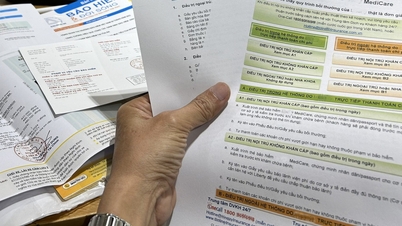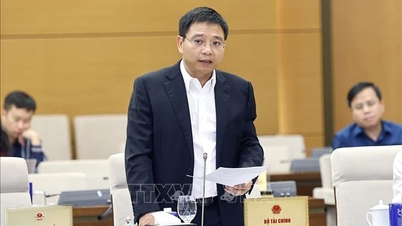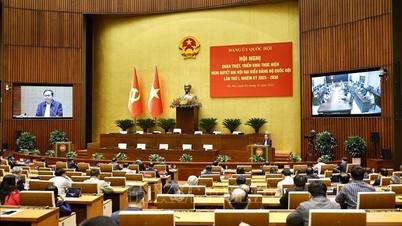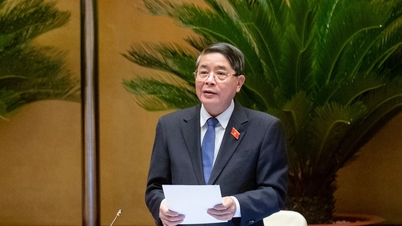
National Assembly Chairman Tran Thanh Man - Photo: National Assembly
Speaking at the meeting, National Assembly Chairman Tran Thanh Man said the Law on Public Debt Management has created a clear change in public debt management, as government debt is lower than the allowed limit, showing that public debt management is relatively good.
Carefully evaluate the re-lending allocation to the central budget
However, it is necessary to comprehensively amend the Law on Public Debt Management, following a simplified procedure at this session to decentralize power in line with related laws, promote administrative procedure reform, and speed up the progress of projects with foreign loans.
Especially in the conditions of implementing two-level local government, many ODA projects and foreign loans are at the commune level.
The amendment of the law also aims to be transparent, public, and proactive in public debt management. For example, the Can Tho Oncology Hospital project has been implemented many times, construction has been 80% complete, but the project has been stopped for 4-5 years, "gathering moss and algae" while the current oncology hospital is overloaded, and needs to be focused on to put the project into operation.
Accordingly, the National Assembly Chairman agreed with the proposed amendments and contents of the bill, aiming to enhance local proactive responsibility and budget implementation.
In particular, regarding the allocation of foreign preferential ODA loans, the draft stipulates cases of allocation to provincial People's Committees and public service units that are allowed to re-borrow.
He proposed that the Government strictly regulate conditions, allocation rates, and assess the impact on the central budget.
Because in the future, localities will propose to borrow more foreign loans, thereby creating a higher burden of obligations for the central budget, so it is necessary to monitor and impose sanctions to ensure strict management of this loan.
Not to mention that ODA loans must have counterpart capital and government guarantees. For localities with conditions, the arrangement of counterpart funds is convenient, but for localities with difficulties, the central government must support 100%, so it is necessary to carefully regulate the coordination between the central government and localities in capital allocation.
Regarding the lending method, the draft adds a provision that commercial banks will make loans and not bear credit risks. According to the National Assembly Chairman, it is necessary to carefully assess the impact, because if lending is done but not bearing credit risks, it can lead to "loose" appraisal procedures, borrowers, create great risks and state agencies will have to bear them.
"This is the reality of recent times, ineffective lending, lack of responsibility in monitoring loans, affecting debt repayment capacity and public debt safety. The most frightening thing is that this loan is used to invest in other things, banks lack guidance, inspection and supervision" - the National Assembly Chairman raised the issue.
Therefore, he suggested that it is necessary to clarify how commercial banks' responsibilities are regulated in the event of failure to repay loans. If banks have to share part of the risk, what percentage should be determined? There should be regulations in the law or the Government should provide guidance in a decree.
Issuing local bonds for the Government to do or to do?
Regarding the issuance of government guarantees, the draft stipulates that the Ministry of Finance does not conduct appraisal but relies on the appraisal results of credit institutions. According to Mr. Man, this provision does not clearly show the responsibilities of the guarantee-issuing agency and the credit institution that conducts appraisal, increasing administrative procedures and creating more intermediate levels... Therefore, it is necessary to regulate this issue more clearly.
In addition, regarding regulations related to the issuance of local government bonds, the National Assembly Chairman also suggested that careful evaluation is needed because recently there have been very few issuances, except in large cities and provinces such as Hanoi and Ho Chi Minh City.
Therefore, he believes that bond issuance should be concentrated at the central level, then the Government will manage the allocation to localities, ensuring conditions for local borrowing and debt repayment. The goal is to create confidence for investors and people.
In the context that we are implementing many large projects such as the North-South high-speed railway requiring capital of up to 67 billion USD, many urban railway projects, connecting railways... Therefore, Mr. Man said that it is necessary to review all central and local loans to amend the law accordingly to serve double-digit growth.
Back to topic
NGOC AN
Source: https://tuoitre.vn/chu-tich-quoc-hoi-so-nhat-la-vay-khoan-nay-lai-ve-dau-tu-viec-khac-20251103113654902.htm



![[Photo] Ho Chi Minh City Youth Take Action for a Cleaner Environment](https://vphoto.vietnam.vn/thumb/1200x675/vietnam/resource/IMAGE/2025/11/04/1762233574890_550816358-1108586934787014-6430522970717297480-n-1-jpg.webp)
![[Photo] The road connecting Dong Nai with Ho Chi Minh City is still unfinished after 5 years of construction.](https://vphoto.vietnam.vn/thumb/1200x675/vietnam/resource/IMAGE/2025/11/04/1762241675985_ndo_br_dji-20251104104418-0635-d-resize-1295-jpg.webp)

![[Photo] Panorama of the Patriotic Emulation Congress of Nhan Dan Newspaper for the period 2025-2030](https://vphoto.vietnam.vn/thumb/1200x675/vietnam/resource/IMAGE/2025/11/04/1762252775462_ndo_br_dhthiduayeuncbaond-6125-jpg.webp)
![[Photo] Ca Mau "struggling" to cope with the highest tide of the year, forecast to exceed alert level 3](https://vphoto.vietnam.vn/thumb/1200x675/vietnam/resource/IMAGE/2025/11/04/1762235371445_ndo_br_trieu-cuong-2-6486-jpg.webp)



































































































Comment (0)